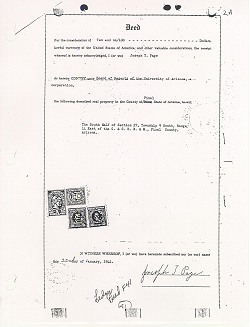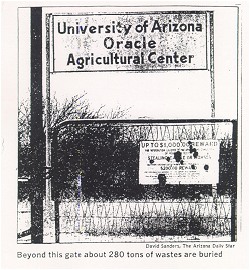|
PARTON 2
pension from the State
of Arizona. A young man was engaged to take care of his place and to carry
on the work.”(14)
The article
chronicles Page’s own words:
“But he didn’t feel
about it like I did. He couldn’t see much of a future in it for him. As
for me, well I worried all the time- afraid the gate was open or the fences
down and that stock would get in and undo in a short time what it had taken
me years to do. Besides, I felt that I owed something to the state that
was paying me a pension. I could pay that debt by building up the land
for the future. It would be better for the next generation and would be
worth more in taxes to the state. Of course, I could have sold the place,
but I wanted to be sure just what would be done with it.”(14)
 On January 22, 1941 at the age of 83, Joseph Page transferred his property
to the Board of Regents of the University of Arizona for the sum of ten
dollars. The intent of his gift was to bequest an area for arid land studies.
Page was a visionary who saw an alternative to mechanized large scale farming.
He had nurtured and recovered the grasslands on his property. At the time
of his bequest, Page Ranch was an island of healthy Sonoran Desert Grassland
in an ocean of desiccated rangeland. (1)
On January 22, 1941 at the age of 83, Joseph Page transferred his property
to the Board of Regents of the University of Arizona for the sum of ten
dollars. The intent of his gift was to bequest an area for arid land studies.
Page was a visionary who saw an alternative to mechanized large scale farming.
He had nurtured and recovered the grasslands on his property. At the time
of his bequest, Page Ranch was an island of healthy Sonoran Desert Grassland
in an ocean of desiccated rangeland. (1)
Later
that year, on September 26, the Board of Regents accepted the adjoining
parcel from Emma G. Kerr, widow of James Alex C. Kerr, for an additional
ten dollar purchase price.(2) Together, they would come to be called the
Page Ranch International Center for Arid Lands Agriculture. An UA document
records the Focus/Philosophy for Page Ranch activities:
 "The Page Ranch can become
a unique field station for experimental research and demonstration projects
related to appropriate systems and technologies for living in arid regions.
The focus could be on rural/remote situations, with an emphasis towards
self- sufficiency, decentralization and appropriateness for developing
nations.” (3)
"The Page Ranch can become
a unique field station for experimental research and demonstration projects
related to appropriate systems and technologies for living in arid regions.
The focus could be on rural/remote situations, with an emphasis towards
self- sufficiency, decentralization and appropriateness for developing
nations.” (3)
At the time of Joseph Page’s bequest, in
1941, an innocence remained which |